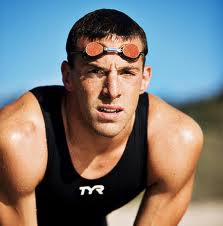Update: An AP story quotes the 10K winner, Thomas Lurz, arguing both that the water was too warm for racing and that there was insufficient in-water support.
The news of Fran Crippen’s death during a 10K World Cup race in the United Arab Emirates has stunned and saddened the OW community, with wide speculation that high water temperatures (as high as 86 or 87 degrees F) were likely a significant contributing factor. (Several other swimmers were treated for exhaustion and deyhdration.) UAE swimming officials are reporting that he “died from overexertion,” which isn’t really saying anything.
Crippen failed to finish the race, which apparently was the first point at which anyone realized he was missing. (His body was found by divers two hours later.) Which makes me wonder what kind of in-water support the race was running. This wasn’t a mass-start triathlon with hundreds of swimmers in the water. Were there enough support boats and rescue personnel on hand to monitor the swimmers?
There will certainly be many questions about whether Crippen’s death might have been prevented. Already several sources have pointed out that FINA has a minimum, but no maximum, temperature limit for OW races. Fingers will be pointed, blame will be thrown about. At 10KSwimmer, however, Steven Munatones offers a moving tribute to the person and the swimmer.


I BELIVE UAE AND INT.SWIMMING FEDERATION ARE DIRECTLY
RESPONSIBLE FOR YOUNG MANS DEATH- SWIMMING CONDITIONS
DEPLORABLE- ESPECIALLY UNDER A DIRECT AFTERNOON SUN.
I ALSO CONDEMN THE SWIMMER S COACH WHO WAS TOLD
BY SWIMMER HE WASN T FEELING WELL AND YET ALLOWED SWIMMER
TO CONTINUE.
I AM HEARBROKEN AND SADDENNED BY THIS – EVEN THO I NEVER
KNEW THE YOUNG MAN.
Magnesium may tie to athlete death
By William J. Rowe | Albemarle County
Published: November 26, 2010
» 0 Comments | Post a Comment
The recent death of swimmer Fran Crippen, former All-American at the University of Virginia, during a 10-kilometer open water race at Dubai is not surprising considering that water temperatures at the time in the mid- to high 80s.
Based on my published studies (The Lancet) of Sy Mah, holder of the Guinness Book of records for having completed 524 marathons; Mary Hanudel, 1987 U.S. ultramarathoner of the year; and Lorna Michael, who completed a 2,900-mile staged race across America in 1993, all of whom showed significant magnesium deficiencies, I believe there is a very strong case for a magnesium deficit playing a major role in this athlete’s death.
If only Crippen and his coach had been aware of the importance of insuring that all athletes maintain sufficient magnesium intake during training and competition, particularly in the heat.
Heat stroke, triggered by exertion, is deadly; the mortality rate is at least 50 percent. As an internist in private practice, I was once called to the emergency room to treat a runner at a 10-kilometer race who had a temperature of 108 degrees, extreme agitation and impending shock. How fortunate I was that my patient was on land and arrived to the emergency room in time.
One of the earliest symptoms of impending heat stroke is progressive extraordinary fatigue. When an award-winning athlete, who has traveled halfway around the world to compete, in desperation tells his coach during the race that he is “tired,” the consequences of ignoring this symptom can be fatal, particularly when swimming.
There may be thousands of people drowning every year because of unrecognized magnesium deficiencies while in water of various temperatures, but unfortunately there is no way to prove it.
Foods that raise magnesium levels are nuts; legumes (beans); dark, leafy vegetables; dried fruit, and whole grains. These should be taken by those who are sedentary as well. Prevention of deficiencies can also be acquired by taking supplemental magnesium. A total of 6 to 8 milligrams of magnesium citrate (for example) per kilogram of body weight per day, divided into morning and evening doses, should be sufficient for most — provided there is adequate renal function. It is important, however, to avoid excessive calcium intake, which will offset the magnesium supplement’s effects.